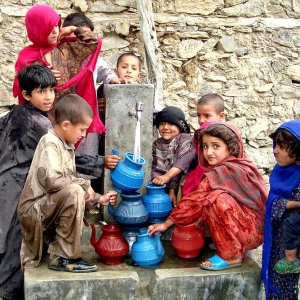Federal Water Tap, June 24: Senate Committee Approves PFAS Package
The Rundown
PFAS package moves along in the Senate. The EPA inspector general opens investigation of a water permit issued for a Minnesota copper-nickel mine, while the VA’s watchdog criticizes Legionella management at a California hospital. USAID reports on its water and sanitation programs. A USDA agency finds that farmers are confused about water testing provisions in a food safety rule. No change in the Lake Erie algal bloom forecast. And lastly, the Federal Water Tap is going on hiatus until July 22.
“It is regrettable to me that the EPA has been dragging its feet on this issue, to the extent that Congress is compelled to act. But ensuring the public’s faith in their drinking water is vitally important.” — Sen. Shelley Moore Capito (R-WV) at a PFAS bill markup. Capito’s committee advanced the legislation, which is a compilation of several bills. One provision requires the U.S. Environmental Protection Agency to set a national drinking water standard for at least PFOA and PFOS, the two most-studied of the thousands of PFAS compounds. The bill package is being attached to a Defense Department spending authorization bill.
By the Numbers
$449 million: Spending in fiscal year 2017 on water, sanitation, and hygiene programs abroad. Nearly one-third of the funds were spent in Jordan. (U.S. Agency for International Development)
$9 million: Grant funding for 18 projects designed to safeguard water supplies in western states. The small grants will support groundwater recharge, municipal water storage tanks, treatment systems, and monitoring evaporation rates at reservoirs. (Bureau of Reclamation)
News Briefs
Water Bills in Congress
Besides the PFAS package, which advanced out of committee, several new water-related bills appeared.
- Senators representing western states introduced the Drought Resiliency and Water Supply Infrastructure Act, which extends funding authorizations in a 2016 water infrastructure bill. Those include money for groundwater storage and reservoir expansions, water recycling, desalination, and ecosystem restoration.
- Two Massachusetts representatives introduced the STOP CSO Act, which requires publicly owned wastewater treatment plants to notify the public of a sewage spill into local waterways within four hours.
- Rep. Antonio Delgado (D-NY) introduced the PIPE Act, which authorizes $500 million a year for grants to communities who need help complying with federal drinking water and wastewater standards.
Minnesota Mine Investigation
The EPA’s internal watchdog is opening an investigation of a water pollution permit granted to a proposed copper-nickel mine in northern Minnesota.
Leaked documents revealed that EPA staff objected to conditions in the state-approved permit, the Associated Press reports. But at the behest of a state official, those concerns were read over the phone and not submitted in writing. That dodge kept the concerns out of the public record, according to emails released by a union for the EPA’s regional office in Chicago.
Studies and Reports
Legionella Management Deficiencies at VA Hospital
A Veterans Health Administration hospital in California was not properly managing its water system to inhibit the growth of Legionella bacteria, according to a government watchdog’s report.
The Office of the Inspector General for the Department of Veterans Affairs found general uncleanliness at the Loma Linda healthcare facility. Investigators did not find inappropriate testing procedures for bacteria, but did note that water temperatures were kept too low and measures were not in place to communicate to doctors the test results for Legionella in the facility’s water system.
In context: Deadly Legionnaires’ Disease Outbreaks Persist in the U.S.
Mapping the Mississippi River Alluvial Aquifer
Nearly a century of pumping groundwater to irrigate rice, soybeans, and cotton in the Mississippi delta has severely depleted the region’s underlying aquifer.
How much water remains is unknown, largely due to uncertain about the physical features of the aquifer: its depth and how it responds to pumping.
To inform future studies, the U.S. Geological Survey mapped the aquifer.
Food Safety Rule Confusing to Farmers
Confusion and misunderstanding reign when it comes to a new federal food safety rule, according to a report from the U.S. Department of Agriculture’s Economic Research Service. The rule is designed to prevent disease outbreaks from the production, harvest, and packaging of produce.
Existing research indicates that testing irrigation water for microbes is the least costly food safety measures, the report states. But farmers “frequently cited water testing as a challenge.”
Farmers, especially in remote areas, were concerned about the time investment in water testing. Some reported having to drive two to three hours to deliver a sample to the nearest testing facility.
The report is based on about 50 interviews that ERS conducted in 2016 and 2017, before the rule went into effect.
Lake Erie Algae
NOAA’s forecast held steady last week. Researchers still expect a larger-than-normal bloom, ranking at least a 7 on the 10-point scale. The size of the bloom does not indicate its toxicity.
On the Radar
Congressional Hearings
- On June 25, the House Oversight and Reform Committee holds a hearing on hurricane and fire disasters. Witnesses will discuss recovery from floods and fires in the last two years, and how agencies are preparing for 2019.
- On June 25, the House Transportation and Infrastructure Committee looks at restoration of America’s iconic waters, including the Chesapeake Bay, Puget Sound, and San Francisco Bay.
- Also on June 25, the Senate Energy and Natural Resources Committee discusses the Land and Water Conservation Fund.
In context: After Fair Bluff Flooded
Away Message
The Federal Water Tap will take a summer break starting next week. The weekly digest will resume on July 22.
Federal Water Tap is a weekly digest spotting trends in U.S. government water policy. To get more water news, follow Circle of Blue on Twitter and sign up for our newsletter.
Brett writes about agriculture, energy, infrastructure, and the politics and economics of water in the United States. He also writes the Federal Water Tap, Circle of Blue’s weekly digest of U.S. government water news. He is the winner of two Society of Environmental Journalists reporting awards, one of the top honors in American environmental journalism: first place for explanatory reporting for a series on septic system pollution in the United States(2016) and third place for beat reporting in a small market (2014). He received the Sierra Club’s Distinguished Service Award in 2018. Brett lives in Seattle, where he hikes the mountains and bakes pies. Contact Brett Walton







Leave a Reply
Want to join the discussion?Feel free to contribute!